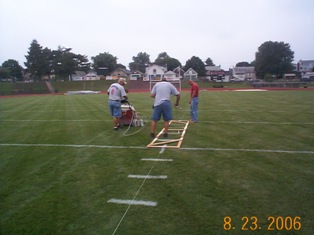By Sarah K. Martin, CSFM
I quickly discovered after taking a job with the City of Phoenix Parks and Recreation department 13 years ago that managing the turf was going to be the “easy” part of my job. I had gone from a staff of two (including myself) to a staff of 14. Doesn’t seem that complicated, right?
Managing the crew soon became the biggest issue I had. The 10 main things that helped me to become a better manager are:
Learn what each individual’s strengths and weaknesses are. Work them to their strengths, while teaching them to improve on their weaknesses. Take the time to work one-on-one with staff to learn how they work. Do they hate line trimming? Do they love infield work? On the job training is great, but also take advantage of classes and seminars through your local STMA chapters and other organizations. There is something about getting off-site that helps to improve learning. Seeing how other facilities handle situations is another great learning opportunity.
Be organized! Know what needs to be done and delegate tasks evenly to the crew. Part of this is knowing how long each task will take as well as which tools and equipment will be involved so that everyone has access to what they need. Asking someone to do a job only goes so far if they don’t have the proper tools at hand to accomplish the job. Set your staff up for success, not failure.
Communicate! I can’t stress this enough. Staff will not know what you want them to do, or how you want them to accomplish it, if you do not tell them! Seems basic, but it is often overlooked. Take the time to go over details, and ask staff to repeat them back to you to make sure that they heard what you were trying to say. For instance, you might ask an employee to trim the trees by the football field up above 8 feet, and what they hear is to trim the trees by the baseball field into shrubs. This will show you that more clarification and instruction is needed.
Do not play favorites. You will naturally have crew members with whom you feel more comfortable. Do not allow this to cause you to treat anyone with favoritism. Make sure to distribute tasks evenly. Unless your situation does not allow it, teach all the staff to do all the jobs. Just because you mainly do infields does not mean that you do not need to know how to change a sprinkler head.
You aren’t there to be anyone’s friend. While this can be hard to deal with, as people generally want to be liked, it is more important that you are the boss. It is important that you stand up for everyone, and don’t allow yourself to be taken advantage of. However, respecting everyone is essential. This doesn’t mean you can’t actually be friends, just be as impartial as possible to avoid accusations and unnecessary conflict.
Take careful notes of issues. Keeping detailed notes will allow you to see when patterns in behavior appear, as well as to follow a progressive plan of discipline. For me, this is done by keeping a file on each employee in a locked cabinet in my office. If something happens, I simply jot a note and drop it in the file. It may turn out to be nothing, but if it escalates, I have it covered. This is a great help when it comes to doing annual reviews. What you think you will remember in June is a distant memory the following April.
Be consistent with discipline. If you don’t have a company policy/plan for discipline, create one and stick with it! An example is:
- 1st offense: coaching
- 2nd offense: written reprimand
- 3rd offense: 1 day suspension
- 4th offense: 3-day suspension
- 5th offense: termination
Each issue, from attendance to how to handle equipment, should be discussed with staff upon hiring. Rules should be well known to avoid the excuse of “I didn’t know I couldn’t do that”.
Always discipline in private. While general statements can be made to the entire crew, keep actual discipline and details private. This is essential to keep respect between you and the staff. No one wants their dirty laundry broadcast on the news.
Always remember the Golden Rule. Treat others as you wish to be treated. This is huge. Staff will almost always respect you if you respect them. Remember that their lives don’t revolve around the job. They have families, friends, pets, etc. Be aware that if someone is having a bad day, it may not be related to work. While issues need to be addressed, allow some wiggle room for when things may take a turn for the worse. Make sure to offer assistance programs if they are available through your organization. Sometimes everyone needs a little help.
Lead by example. You can not expect someone to do something that you yourself aren’t able or willing to do. While you don’t have to be Superman/Woman, you have strengths and weaknesses too, showing staff that you can do the job goes a long way to gaining respect. When staff knows what you understand and are capable of doing the jobs they do, they tend to do a better job themselves.
There are many ways to manage. Take the time to find your style, all the while remembering that people have their own way of learning, so be flexible.
And one last thing: never be afraid to ask for help. Someone you know has probably had the same staff issues you are dealing with, and will be able to help you figure it out. So join your local STMA chapter and talk to your co-workers. They are an invaluable source of information.
Sarah K. Martin, CSFM, works for the City Of Phoenix, Parks and Recreation, Special Operations Division and the Reach 11 Sports Complex.



